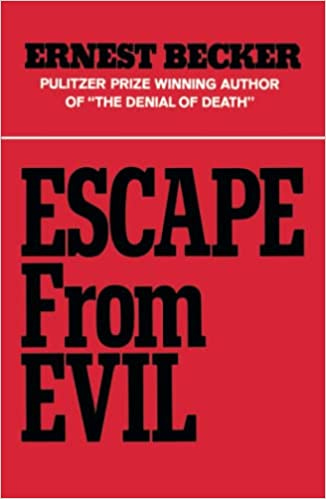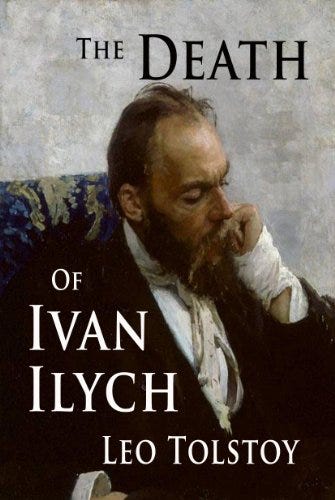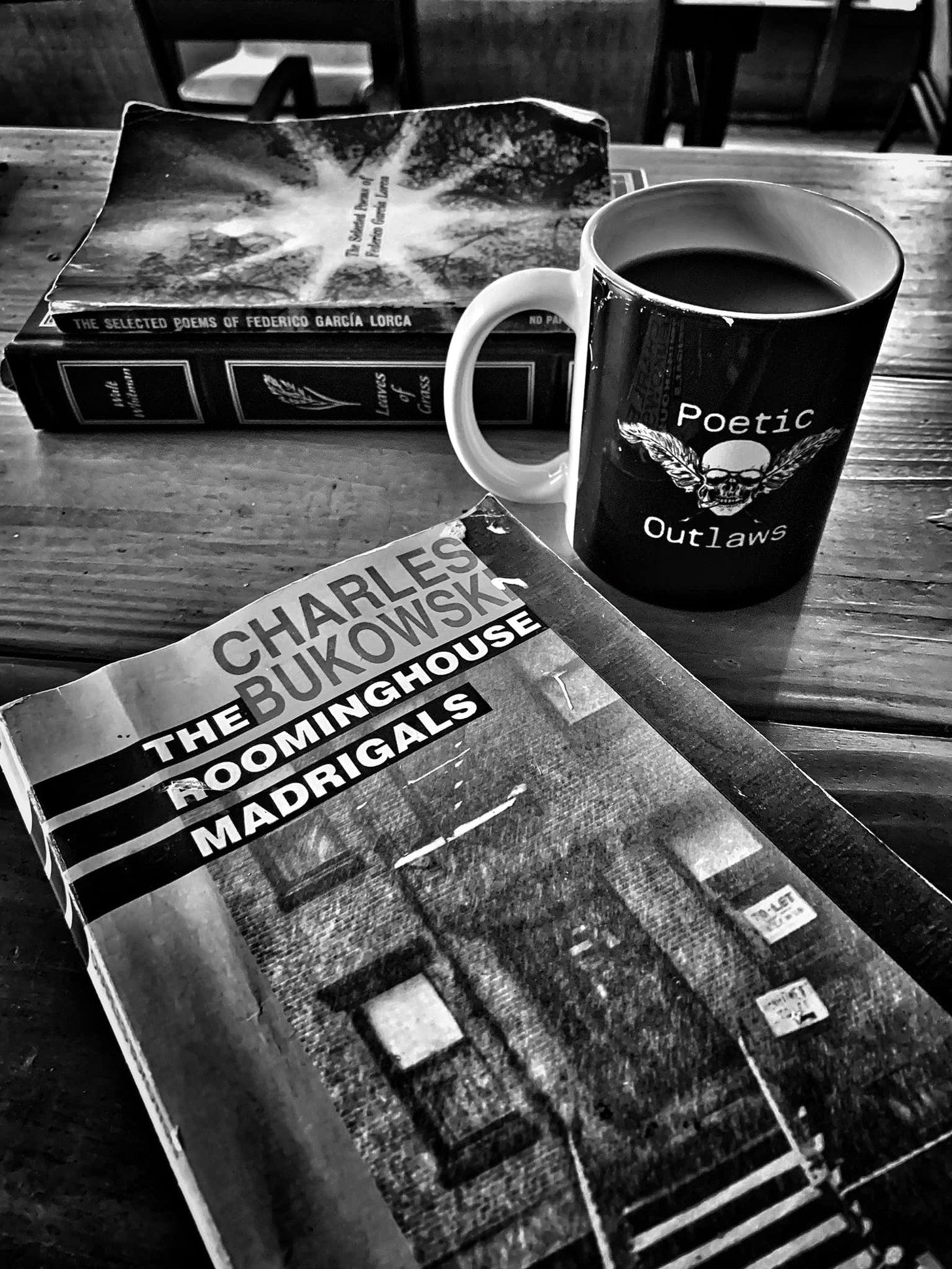“The books that the world calls immoral are books that show the world its own shame.”
– Oscar Wilde
Happy Friday Subscribers.
It’s that time of the week when I throw out a few mind blowing Poetic Outlaws books that I think you should read. At the bottom, I have a short list of the books that I’m currently reading. Appreciate you poetic humans following this page.
You can check out last week’s recommended books here — https://bit.ly/38oP9gd
Let’s go!
1. ‘Escape from Evil’ by Ernest Becker
I truly believe that Ernest Becker was one of the most profound writers of the 20th century. In this superb book, a book that I’ve read multiple times, Becker explores the history of evil. He sets out to find out why human beings are such vicious and “horribly destructive” creatures.
Death is the ultimate cause of all anxiety and each society is a hero system that promises victory over evil and death. Earth, in other words, is to be considered “as a theater for heroism” and our lives as a “vehicle for heroic acts” which aim to transcend evil. But Becker also points out that we defeat ourselves “by trying to bring absolute purity and goodness into the world."
In other words, evil is introduced into the world by our attempts to transcend our animal nature and affirm our own lives. Becker again, “The thing that makes man the most devastating animal that ever stuck his neck up into the sky is that he wants a stature and a destiny that is impossible for an animal; he wants an earth that is not an earth but a heaven, and the price for this kind of fantastic ambition is to make the earth and even more eager graveyard than it naturally is.”
2. ‘The Death of Ivan Ilyich’ by Leo Tolstoy
This is one those books that will stay lodged up in your head and heart for a lifetime. Tolstoy, perhaps the greatest writer of all time, wrote this little Novella late in his life as he was approaching death. It’s one of the great meditations on life and death.
From Amazon: Hailed as one of the world's supreme masterpieces on the subject of death and dying, The Death of Ivan Ilyich is the story of a worldly careerist, a high court judge who has never given the inevitability of his death so much as a passing thought. But one day death announces itself to him, and to his shocked surprise he is brought face to face with his own mortality. How, Tolstoy asks, does an unreflective man confront his one and only moment of truth?
This short novel was the artistic culmination of a profound spiritual crisis in Tolstoy's life, a nine-year period following the publication of Anna Karenina during which he wrote not a word of fiction. A thoroughly absorbing and, at times, terrifying glimpse into the abyss of death, it is also a strong testament to the possibility of finding spiritual salvation.
Here’s a brief passage from this profound novella:
“Morning or night, Friday or Sunday, made no difference, everything was the same: the gnawing, excruciating, incessant pain; that awareness of life irrevocably passing but not yet gone; that dreadful, loathsome death, the only reality, relentlessly closing in on him; and that same endless lie. What did days, weeks, or hours matter?”
3. ‘The Colossus of Maroussi’ By Henry Miller
From Amazon: “Like the ancient colossus that stood over the harbor of Rhodes, Henry Miller’s The Colossus of Maroussi stands as a seminal classic in travel literature. It has preceded the footsteps of prominent travel writers such as Pico Iyer and Rolf Potts.
The book Miller would later cite as his favorite began with a young woman’s seductive description of Greece. Miller headed out with his friend Lawrence Durrell to explore the Grecian countryside: a flock of sheep nearly tramples the two as they lie naked on a beach; the Greek poet Katsmbalis, the “colossus” of Miller’s book, stirs every rooster within earshot of the Acropolis with his own loud crowing; cold hard-boiled eggs are warmed in a village’s single stove, and they stay in hotels that “have seen better days, but which have an aroma of the past.”
Henry Miller is one of my favourite writers so you’re probably going to see his works on the Poetic Outlaws booklist quite often. Here’s one of my favorite passages from this remarkable book.
“To keep the mind empty is a feat, a very healthful feat too. To be silent the whole day long, see no newspaper, hear no radio, listen to no gossip, be thoroughly and completely lazy, thoroughly and completely indifferent to the fate of the world is the finest medicine a man can give himself. The book-learning gradually dribbles away; problems melt and dissolve; ties are gently severed; thinking, when you deign to indulge in it, becomes very primitive; the body becomes a new and wonderful instrument; you look at plants or stones or fish with different eyes; you wonder what people are struggling to accomplish by their frenzied activities; you know there is a war on but you haven’t the faintest idea what it’s about or why people should enjoy killing one another…”
Currently Reading:
The World of Yesterday by Stefan Zweig
A Little Larger Than the Entire Universe: Selected Poems by Fernando Pessoa
Desolation Angels by Jack Kerouac
The Rape of the Mind: The Psychology of Thought Control, Menticide, and Brainwashing by Joost Mereloo
Happy reading, folks. Hope you all have a poetic weekend. Cheers till next time.
Don’t forget to visit our store and pick you up a Poetic Outlaws shirt or coffee mug. As Bukowski reminded us, “Style is the answer to everything.”
Click here to check it out —> https://my-store-11497766.creator-spring.com/









Great recommendations. I’ve read just one of the three. I’d be very interested in your review of Desolate Angels. With the exception of On the Road and Big Sur, which are riveting and beautiful, tender and tawdry, I sometimes do the nodding thing. Tell me if I should read it. I sometimes think when the focus is free association and sounds, you need music to go along with it—the way Dylan took Jack into the mainstream of America on the wings of the radio as poet in chief. Ivan should be required reading. It only takes an hour. I have a poem about Ivan at my Substack shack Shakespeare’s Monkey: The Dying of the Light. The other title sounds interesting, too. Nice work.